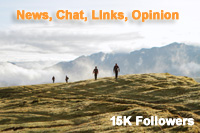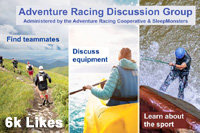Le Tour de Volcano; Team AVAYA Captain's Report
Nathan Fa'avae / 22.11.2018



In 2016 I stepped away from top level adventure racing after winning the World Champs in Australia. The reasons were that I’d struggled in training and during the race with a knee injury that I was scheduled to get surgery for in 2017. That alone was enough of a reason, but I was also wanting to create more time to invest into a business I am an owner of, Absolute Wilderness Freeze Dried Meals. After racing extensively on the AR World Series and World Champs since 2011, I wanted a break. I wasn’t sure if I’d race again, but I said if there was the chance to race in a competitive team, in a country that I wanted to visit, and there was some prize money, then I’d be open to the possibility.
After not racing in 2017, things started to change for 2018 when my wife Jodie asked me to race GODZone with her, she had never done an expedition length race and wanted a physical challenge to train towards. We invited two friends to join us and we had a fun race, finishing 4th. In the search for a sponsor for the race we contacted Avaya, who were equally keen to see the team defend the World Title at Réunion Island.
Réunion Island? Where is that I asked when I heard it would be the stage of the 2018 Adventure Racing World Championships, racing in a location I haven’t heard about before appeals to my sense of travel and exploration, I was interested.
Situated in the Indian Ocean to the east of Madagascar, the island is a French colony and the race was organised by the Raid In France event management team, who also organised the 2012 World Championships in Europe. Réunion Island is known for its volcanic, rain forested interior, coral reefs and beaches. Its most iconic landmark is Piton de la Fournaise, a climbable active volcano standing 2,632 metres. The higher cones rise to over 3,000 metres. The island measures 63km north to south and 45km west to east.
We raced with the number one race bib from the 63-teams competing, representing 25-countries.
As defending World Champions from having won the 2014-2017 world titles as team Seagate, for 2018 we had a different team from 2017 and a new sponsor, Avaya. The regular team members and ace navigators Chris Forne and Stu Lynch were back competing with Fleur Pawsey and myself joining them. I didn’t race in 2017 but captained the Seagate team at the World Champs from 2011-2016. Fleur only joined the team 7-weeks prior when Jo Williams who raced the previous two world champs, injured herself skiing. When we needed to find a substitute for Jo, we turned to the founding female racer of the team Sophie Hart, who has stepped back from racing to raise her family. Sophie, who knows how the team functions better than anyone, believed that Fleur would be the best person to join us. Fleur is an experienced adventure racer and a good friend so she blended into the team seamlessly.
Traveling to the race was a fairly long journey. Chris, Stu and I left Auckland for Singapore, loaded with bikes, Frontier pack rafts, 10 kilos of Absolute Wilderness Meals and a few other bits of equipment for the race. We had a full day in Singapore so we escaped from the airport and went mountain biking, hiking, swimming and drank coconuts at Pulau Ubin Island, it was an excellent way to break up the journey, and riding poorly maintained rental bikes on technical mountain bike trails was hugely entertaining. Back through the tedium of customs and immigration, putting laptops into plastic trays, we then flew onto Mauritius and then a final hop to our end destination. Singapore Air was really good to fly with.
We arrived in Réunion Island three days before the race and enjoyed a relaxing preparation of our gear and adjusting to the time zone and climate. Other than a few shorts walks to the local store, we spent our time at the resort getting race ready, jogging on the beach and soaking in the warm ocean waters, I have to admit it was nice to have a small holiday ahead of the competition.
Fleur was on a different flight route to us and arrived later that day, so once all the team was together we were able to start discussing and planning how we’d approach the race. Most of the other teams were staying at the same resort, which is where the event was based from so it was a social time catching up with the all familiar faces from around the world.
Given that Fleur had only 7-weeks to prepare and that I’d been absent from racing at that level for two years, combined with the heat and the severity of the terrain, we all agreed a conservative start to the race was essential. Before we even received anymore information we had decided we’d start slow and look to increase our pace around the midway point. Before the race I messaged family and close friends signalling to them not to expect us to be leading until the back half of the race, don't panic if it looks like we're off the pace, it's planned. This decision and plan certainly made the days proceeding the race relaxing and without any pre race tension, as we believed the real race wouldn’t start until about 200km through the course, somewhere out there in the cane fields most likely.
The course measured 425km with a winning time aimed at 120-hours. Our first impressions of the course was that it had a very difficult start with a long hiking stage that went to 3000-metres. That distance combined with the climbing and climate meant the first few days would be grueling, but after that the course was dynamically busy with plenty of technical elements and changes of discipline. It felt to us that the course would require some very smart tactical strategies to complete it efficiently, a juggle of extreme conditions, mandatory sleep and multiple dark zones (parts of the course where night travel is forbidden).
Overall it looked like an excellent way to explore the Island. We expected it to be a fun time with our team as we spent the 4-5 days on course. Our only concern pre race was that there appeared to be some very dry areas on the Island and finding enough suitable drinking water could be difficult at times.
The pack rafting stage sounded exciting with legitimate white water to enjoy. Much of the biking we were told was in sugar cane plantations, which we suspected would have some interesting navigation, especially at night. By the time the last night in the resort rolled around, we felt ready and in a healthy performance state, our focus being to get ourselves through the course as fast as we could.
Prologue
The day before the race we bused to the village of Hell Bourg, the venue for the start and prologue. Settled high in the mountains the village was surrounded by sheer steep mountainsides, mostly vegetated but with obvious volcanic influence. Once off the buses we were able to check out the start area, meet our local school kid that each team was allocated, and practice the ‘Kours La Rou’, a local game played by the kids that involves running behind a car tyre keeping it rolling fast using two sticks to steer and control it. We had a lovely little 8-year old girl Kensa as our team mate, but it was apparent early on that she doesn't play Kours La Rou during her lunch breaks. It was fun doing the relay around the village, we ended up about 20th, given the prologue had bearing on how the teams started the following day, it did seem a bit quirky for a World Champs.
We found a nice private campsite near the start line and pitched our tents with the other NZ team, Yealands, we didn’t wait around for the dinner provided, we had our own meals and went to bed. I’m sure we were the first teams off our feet and in bed asleep.
The start the next morning was all very relaxed as teams went off at 30-second intervals based on their prologue result, so we lay on the grass in the sports field until it was our time. The other reason why we were quite relaxed was we hadn’t any of the maps, we would collect them 100-metres after the start line. We did know though that there were a series of abseils close to the start which would create some bottle necks and while we weren’t overly concerned about that, we figured it’d be best to clear the ropes with minimal delays and then settle in for the massive first stage hike.
Stage 1; Trek & Ropes 106km
This stage was every bit as difficult as we expected and some. At times it was insanely scenic but the steep nature of the terrain and high heat especially in the volcanic areas meant that our conservative start to the race paid off, we were even starting to worry we’d gone too hard. We were generally sitting around 5th place in this stage. At the end of the first day I knocked my knee hard on a rock and it started to swell up, it became irritated and made the steep ascents and descents unpleasant, I found it difficult to enjoy the stage much after that.
It took us about 36-hours, we’d stopped for a 30-minute nap and a 1-hour sleep during the stage to log 90-minutes of rest from the mandatory 12-hours we needed to take. I'd go as far as saying this was the hardest opening stage I've ever done in a race, there was some beautiful, dramatic and eye-catching scenes along the route, but there was also periods of intense suffering, scaling steep mountain sides, dripping in sweat, aching legs and joints, swollen feet, pushing through scratchy vines and plants. It was no cake walk.
At the end of the stage we arrived at TA1 in 2nd position soon after Haglöfs Silva (Sweden) and ahead of Naturex (France) but we didn’t know how much sleep they had taken so it was somewhat irrelevant at that point, and it was to soon for us to focus on racing and placings. Overall we felt that most teams had started too fast and pushed too hard, we were certain they would suffer for that in the days to come. Our curiosity was roused by how small most teams packs were for this stage, it seemed to us that Haglöfs Silva, Yealands and ourselves had significantly larger loads than the teams around us, we figured they couldn’t be carrying much food or water, which would only put more stress on their bodies early in the race.
We were the calorific opposite, we were eating an excellent range of nutrition thanks to the freeze dried food, we had sushi, Indian curries, peaches and pears and our team favourite, boysenberries and yogurt. Some teams were going quickly to try and clear some of the pack rafting dark zone but we hadn’t seen the point, it was a high risk strategy with very little to gain in a 5-day race. As expected, no teams started the pack rafting on day two, forced to wait until day three. I think many teams did unrecoverable damage to themselves with the lure of starting the pack rafting on day two. Because we couldn’t start the pack rafting stage until daylight, we were forced to camp overnight, we were in bed by 7pm and when we woke at 3am to make our way to the river, there were about 15-teams regrouped for the paddle stage. Some had barely stopped though, choosing to get on the river with virtually no rest. Despite the hardships of stage 1, our feet were in good condition thanks to regular application of Ready Set Go antichafe made by MAK technologies.
Stage 2; Packraft & Ropes 45km
After a short hike and abseil into the riverbed, this was an amazing river with technical rapids to descend. The water level was low but made it even more interesting. We finished the first river arriving at the coast with 4 teams. It was essentially day 3 of the race. From there we had an upriver pack rafting stage through some highly scenic gorges, then a hike and abseil to the main river. Naturex kept their pack rafts inflated and started the hike along the coast, we deflated ours along with Haglöfs Silva and Yealands, only to have to inflate them again 20-minutes later.
Then we started the upriver paddle. Soon into the stage Yealands opted to deflate their boats again and go on foot which in hindsight was an error, they lost time as a result. We continued upriver and midway Haglöfs Silva dropped off the pace; at the end of the stage we caught up to Naturex. The stage finished at a stunning big deep pool with a waterfall cascading into it, we took the chance to have a swim and cool off before the hiking stage, the sun was high now and it was a scorching hot day. We headed off just behind Naturex and Haglöfs Silva not far behind us. It was at this stage of the race we started to see some weakening of the lead teams; it seemed to us we could move faster than the teams round us, for whatever reason.
We descended an extremely steep mountainside using ropes to access the river. It was inordinately confusing how to get to the river, the rules said we had to follow the marked route but the map didn't show the route and the race staff wouldn't tell us where it was, very bizarre [WTF], we can only think something vital was lost in translation here. We arrived at the river and immediately downstream was a solid grade 3 rapid, we were excited, we had about 20km of this whitewater gorge to reach the ocean. We caught and passed Naturex, and Haglöfs Silva were nowhere to be seen, it felt this was a turning point in the race and we sensed it was time for us to take control, or at least give it a go.
We were thrilled with the performance of our Frontier pack rafts. We had worked closely with New Zealand engineer and paddling legend Hugh Canard to get the best boats for the race. Hugh arranged for our boats to be ultralight, slightly lengthened and self bailing. We felt like we comfortably out-paddled the teams around us on the rivers in the race.
Stage 3: Bike 41km
We rode this stage very hard, we’d nursed ourselves as best we could to this point in the course and we had fresh enough legs to ride strongly. I said to Fleur early on the ride that we don't normally ride this fast, but that we wanted to up the ante and see how the field would react. We lost some time when a control flag was in the wrong place. We hoped to get a few hours lead on the chase teams, perhaps take them by surprise with our sudden increase in speed. Until this point in the race we had been traveling smoothly and steadily. Now we were in race mode and applied pressure, we hoped that would force errors to the chasing teams and we also wanted to get a gap where we could take a long sleep and still retain the lead. It seemed to work well as we gained a gap and then took a 4-hour sleep to recover at the end of the stage; we found a balcony behind a restaurant that was perfect, it was next to a river so it blocked out other noise, we found a stack of corflute to make beds, providing comfort and insulation, we had a high quality rest. We departed on stage 4 in the lead position.
Stage 4; Trek & Bike 27km
This next stage was along the coast and it was important for us to keep a constant effort and make the chasing teams work hard. After some heavy rain overnight it was sticky hot and humid as we scrambled around the coast on slippery rocks, sweat beads falling off us. There was some fascinating volcanic formations along the coast and we scaled a cliff face of lava along the route, exceptionally unique. We were moving strong after a sound sleep and started to feel in control of the race. The sun rose and we enjoyed some magical ocean views and some glimpses up the volcano we’d scale later in the day. It looked hot. This stage included a short bike ride to end, we collected our bikes and sped along the highway to the next TA.
Stage 5; Trek 32km
This stage while not far in distance, climbed to the volcano making it another massive challenge, exposure to heat and a sharp elevation gain. The scenery would have been off the planet but thankfully for our bodies, there was cloud and mist in the crater which meant we didn’t see much; it was a relief not to have direct sunlight frying us. The stage started along the coast and contained a tricky checkpoint early on. Chris sensed it and was very diligent making progress along the coast, frequently diverting to the cliff edge to confirm his location along the shoreline; as a result he found it quickly but we all agreed it had the potential to cause issues for other teams if they didn’t spike it, especially at night. We were starting to worry about resupplying our water before the ascent until we found a shallow trapped in a rocky stream bed. Somewhat ironically, after refilling our water from a slightly sketchy source, we hiked for 10-minutes and popped onto a highway and there was a restaurant selling chilled water and drinks, we couldn’t be bothered stopping again so we hit the climb.
The trail in places was difficult to follow, it was overgrown and we got scratched up, but as we got higher it cooled off and as the day drew to an end we were wearing all our gear trying to stay warm, a strange contrast from the sweltering heat of the lowlands. By this stage of the race we were certainly doing our own suffering at times and it took a lot of perseverance to keep pushing on. We were glad to finish the stage and collect our bikes.
Stage 6; Bike & Trek & Caving 51km
The joy of having our bikes was short lived as we had to carry them down a steep un-rideable trail for a few hours. We had to drop thousands of metres and this was a heinous way to do it, but that was the course so onward we went. Towards the bottom we stopped and went to a checkpoint in a lava cave, a small detour to break up the bike carrying and pushing. Down in the valley we reached a checkpoint and it was the ideal time to sleep, we found a nice area to camp in the forest and enjoyed a 3-hour sleep. During our sleep Naturex passed by but once we were up and refreshed we made really good time, now able to ride our bikes we dropped to the sea and rode to the next TA for a short leg to the kayaks.
Stage 7; Trek & Ropes 3km
We were almost at the sea, another abseil and riverbed scramble, it was only an about an hour and we waltzed into the kayak TA. We were really looking forward to paddling on the ocean, being on the water and in the sea breeze. Naturex were in the TA when we passed through, we assumed they were taking sleep but it transpired later they were serving a penalty for losing some equipment.
Stage 8; Kayak 37km
Finally back in our happy place, paddles in hand and on the sea. It felt refreshing being on the water and looking back at the Island we’d spent four days climbing up and down on. The kayak was a chance for us to refuel and prepare for the final mountain bike ride which we expected to be an arduous stage. We ate and drank and took a swim midway through the stage to cool off; after about 6 hours we arrived at the TA.
Stage 9; Bike 77km
Off the paddle we knew we would win the race if we could be the first team to the top of the epic climb, which was at 2500-metres. We were positioned perfectly for the win but there was still a major obstacle to deal with, a 10-hour mountain stage climbing again to the top of the island. We had used up all our mandatory sleep so we didn’t need to stop again, plus we were in the lead. We guessed the teams behind us must still have sleep time to use up, we couldn’t be 100% sure of that but we wanted to get into the ride and make way, keep the race moving.
The ride began on extremely steep stairs and streets, with the high temperatures and afternoon sun beating down, it was an intensely hard start and we needed to be careful not to go too hard too soon. We chugged up. After about 1000-metres of elevation gain the terrain leveled off and so did the temperature. It became more pleasant. Darkness set in and then it got cool, repeating the irony of the day before where we went from one extreme to the next in just a matter of hours.
Finally we reached the top and prepared for the descent. We were to ride one of the 2017 Megavalanche mountain bike trails halfway down the mountain. It wasn’t the speedy downhill we had hoped for, we weren’t in any state for technical riding nor did we have suitable bikes for the track, so it was a slow trip down. Some parts of the trail were ride-able and as we got lower the riding became more flowing. Once down at the residential level there was a somewhat random series of checkpoints to collect before we could complete the stage.
Stage 10: Trek & Pack Raft 5km
Now it was time to celebrate, we knew we would win the race, all we needed to do was enjoy the last few kilometres to the finish line, race completed, race won. A short riverbed to walk down and then a final pack raft stage down the river and across the harbour, and a beach walk to finish.
Summary
Overall we were in good shape and ready to race, we had trained well and everyone was healthy. We were the race favourite which wasn’t surprising, but that meant very little to us. Each race is a new race with all the same obstacles standing between the start and finish lines. The World Champs always has a highly competitive field and this year was no different. We had the upmost respect for the other teams and complacency is something we fear. We knew to succeed in this race we would need to work hard, race intelligently and extract our best possible performance, anything less would mean we would be down the rankings. We focused on looking after each other and getting through each stage the best we could, and did our best to enjoy the experience to the maximum. As with many adventure races we’ve won, the kayaking stage was once again the turning point in our race, which in this case was pack rafting.
We finished at 3.01am, a race time for the course was 117-hours and 1-minute (17-hours of that was sleeping spread over the first 4-nights). Our winning margin almost 4-hours.
Quite a few times during the race the course felt harder than we expected, but then we realised that we were moving through close to the predicted times and the distances and elevation profiles were exactly what we’d been told, so there shouldn’t have been any surprises. I think the heat and at times the physically demanding nature of the landscape made the event feel much more difficult than it was; we complimented ourselves on our race strategy to start slow and had the discipline to do that. The scenery in the course was incredible and unique to anywhere we’ve raced before. We didn’t have much interaction with the local people on the island but any contact we had they were always friendly, and most likely confused as to who we were and what we were doing.
This race will also be remembered for a high media presence, most of the media content captured is being made into race productions that will be released later in the year and into 2019, there will be some really amazing viewing coming out about the race.
We want to acknowledge and thank the organisation team who provided the event, Pascale and Nancy, and their staff. They did an incredible job of creating the adventure for us and went to many extra efforts to make the course high quality, plus their enthusiasm and support of all the teams was terrific.
I am really proud of the team, to win another World Championship is extraordinary and this one felt like it was against many odds. We didn’t line up with the confidence we have done in recent years.
We didn't have a flawless event, we made some errors and we hurt out there at times. Chris struggled for a period towards the end of day one in the heat and we had to rally around him to get him back to strength. He bounced back and had an ultra strong race physically and with the maps, his navigation was close to perfect. We back tracked no more than a few hundred metres in the entire race. Towards the end Chris managed to source some super powers and his contribution to getting the team over the last ride was immense.
Stu I think had the best overall consistent performance, he was backup navigator to Chris when he needed it and carried a big share of the equipment the whole race. I know Stu suffered at times throughout the race but he just dealt with it. It's no wonder Stu has won every ARWC since 2013.
Fleur did amazing. She had to dig deep many times throughout the race, the reality of having such a minimal lead time to train and prepare. Two months prior adventure racing wasn’t in her thinking and 7-weeks before the start she was in a team, the defending champions' team. We never doubted Fleur’s ability to race with us and we were really thrilled when she agreed to race, we were lucky for that and fortunate that she was willing to race hard. We are very appreciative to her for such a massive effort in the race. She is absolutely worthy of being an Adventure Racing World Champion; in many ways, it’s a deserving title for a talented racer who has been involved in the sport for so long, she is now officially one of the great Kiwi female adventure racers.
I raced well enough. I was disappointed on the first stage to injure myself as I had trained extensively in the mountains in preparation and I was feeling really good. I have to think my age is becoming a factor; I’m sure years ago I took way bigger hits to my body and it didn’t effect me, these days I don’t take the knocks as well. I felt I worked hard through the pack rafting stage and the first bike ride, motivated to get a gap on the field, and from that point on I was never able to fully recover, I did what I could but I relied on support from Chris and Stu to get me through. I know physically I’m not as fast and strong as I used to be, but I also know I bring other qualities and strengths to the team, I can add value in other areas. If I do race the World Champs in Sri Lanka next year there are a few things that I'll change from this year, things I learnt.
I get quite a lot of people ask me what sort of bike I use for adventure racing, for the past few years I have been racing and training on a Santa Cruz Tall Boy, which is the ultimate bike for me, it's a long travel 29er and so sweet to descend on, but given my age and the increasing level of challenge for me to compete in these major events, I know I will need to go to a more specific race bike, most likely a Santa Cruz Blur. I’m not sure what 2019 has in store yet, I may do another race, I may not, but I would like to see the team bid for a world title defense if it worked out.
On behalf of the team I want to thank all the supporters from New Zealand who loyally followed us in the race, there are thousands of people who messaged us and we're really glad we can give you something to celebrate, we also know that for Kiwis it's not just about our team, it's about making NZ proud in this sport where we have a massive history; in this race all the Kiwi athletes represented proudly. Aaron Prince and Corrinne O’Donnell were 2nd, Yealands placed 7th and Sam Clark was racing strongly but his team withdrew midway through, Sam was gutted. NZ remains highly respected in the Adventure Racing world.
Our travels home were an adventure in themselves; we said goodbye to Fleur in Reunion and then we traveled to Mauritius with team Yealands and spent 2-nights there. It was a forced layover for a connecting flight but also allowed us to go kite surfing in Le Mourne for 2 days. Then we had a full day in Singapore where we headed to the artificial surf wave at Sentosa Island, there were a bunch of laughs ... so the trip wasn't just about the race!
Now it’s time to get back to our families and enjoy a summer of adventures with them, we all owe them.
Nathan, Chris, Stu & Fleur









 SleepMonsters
SleepMonsters



